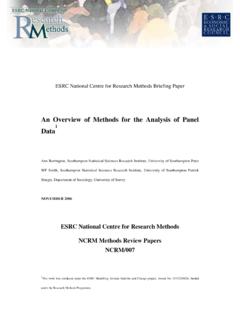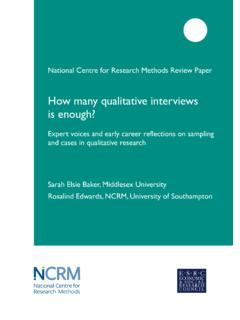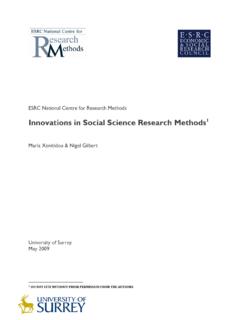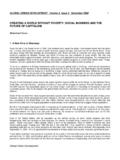Transcription of Anonymity and Confidentiality - eprints.ncrm.ac.uk
1 Anonymity and Confidentiality Rose Wiles, Graham Crow, Sue Heath & Vikki Charles University of Southampton ESRC National Centre for Research Methods NCRM Working Paper Series 2/06 Anonymity and Confidentiality Rose Wiles, Graham Crow, Sue Heath & Vikki Charles University of Southampton Paper presented at the ESRC Research Methods Festival, University of Oxford, July 2006 Email contact: Project website: Please do not quote without permission from the authors.
2 Confidentiality and Anonymity This paper focuses on Confidentiality and Anonymity and explores the ways in which these issues are managed by researchers. It draws primarily on data collected from a study funded as part of the ESRC Research Methods Programme focusing on researchers views and experiences relating to the issue of informed consent in research. The focus is on these issues in relation to qualitative research. Confidentiality and Anonymity are related but distinct concepts. The Concise Oxford Dictionary defines Confidentiality as: spoken or written in confidence; charged with secrets while Anonymity is defined as: of unknown name, of unknown authorship.
3 In the ethics literature, Confidentiality is commonly viewed as akin to the principle of privacy (Oliver, 2003; Gregory, 2003). This principle is integral to our societal beliefs that individuals matter and that individuals have the right for their affairs to be private, although as Bulmer (2001) notes, in our information-led society upholding this right is far from straightforward. To assure someone of Confidentiality means that what has been discussed will not be repeated, or at least, not without permission. The notion of Confidentiality (and Anonymity ) is invariably raised and discussed with research participants prior to their participation in research.
4 However, in the research context, Confidentiality (as it is commonly understood) makes little sense. Confidential research cannot be conducted; researchers have a duty to report on the findings of their research and they cannot do so if the data they collect is confidential ( cannot be revealed). What researchers can do is to ensure they do not disclose identifiable information about participants and to try to protect the identity of research participants through various processes designed to anonymise them. The extent to which anonymisation is successful varies according to the research context.
5 In this respect Confidentiality cannot be assured; researchers can claim that they will endeavour to ensure to the best of their ability that participants are not able to be identified but they cannot promise that this will be the case. As, van den Hoonard notes (2002: 8), promises of Confidentiality are easier to make than to keep . We do not know as much as we might about what sense research participants make of the notions of Confidentiality and Anonymity in relation to research. Promises of Confidentiality are made in relation to other areas of life, such as in interaction with financial institutions and health organisations, but in these contexts meanings differ.
6 We cannot assume that research participants understand the ways in which researchers intend these notions to be understood. Corden and Sainsbury s (2005) work on this topic certainly indicate that researchers and study participants understandings and expectations may vary. Ritchie et al are currently conducting some work exploring this issue further (see ). Furthermore, work by Grinyer (2002) and others (see BERA, 2004: 8-9) have indicated that the research community s commitment to Confidentiality may not be shared by all research participants. The trend towards the interview society and celebrity culture have been identified as factors encouraging research participants to prefer identification over Confidentiality (Silverman, 1993, 1997; Wiles et al, forthcoming) Confidentiality and Anonymity tend to be conflated in much of the literature on research methods.
7 In general, issues of Confidentiality and Anonymity are addressed together in methods textbooks and research ethics guidelines (see, for example, SRA, 2003; BSA, 2004; Ritchie & Lewis, 2003: 67; Smyth & Williamson, 2004: 28). This is not to argue that these sources use the terms interchangeably but rather that the issues raised by these concepts are closely related; Anonymity is a vehicle by which Confidentiality is operationalised. However, anonymisation of data does not cover all the issues raised by concerns about Confidentiality . Confidentiality of data can be seen to include the following: Maintaining Confidentiality of data/records.
8 Ensuring the separation of data from identifiable individuals and storing the code linking data to individuals securely Ensuring those who have access to the data maintain Confidentiality ( , the research team, the person who transcribes the data) i) Not discussing the issues arising from an individual interview with others in ways that might identify an individual ii) Not disclosing what an individual has said in an interview Anonymising individuals and/or places in the dissemination of the study to protect their identity In this paper we explore the difficulties researchers experience in relation to issues of Confidentiality and the ways in which researchers manage these issues in practice.
9 We focus on deliberate and accidental disclosure of Confidentiality and the processes researchers use to manage these issues. Methods Before moving on to explore these issues, we will first outline the research study on which this paper is based. The project focused on how researchers manage issues of informed consent in social research. It involved collecting data primarily through telephone interviews and focus groups with academic and non-academic researchers and focused specifically, but not exclusively, on researchers who conduct qualitative research on or with children, young people, older people, people receiving palliative care, people with learning disabilities and people with mental health problems.
10 The focus on these particular areas of research was made because of the assumed vulnerability of members of these groups within the research process which would enable the issue of informed consent to be exposed with particular clarity. Thirty-one individual telephone interviews were conducted with experienced researchers with reputations for work in these specific areas (n=24) or in research ethics more broadly (n=7). These individual experts were identified through our own knowledge of the area, recommendations from other academics approached to participate, the literature and web searches.














